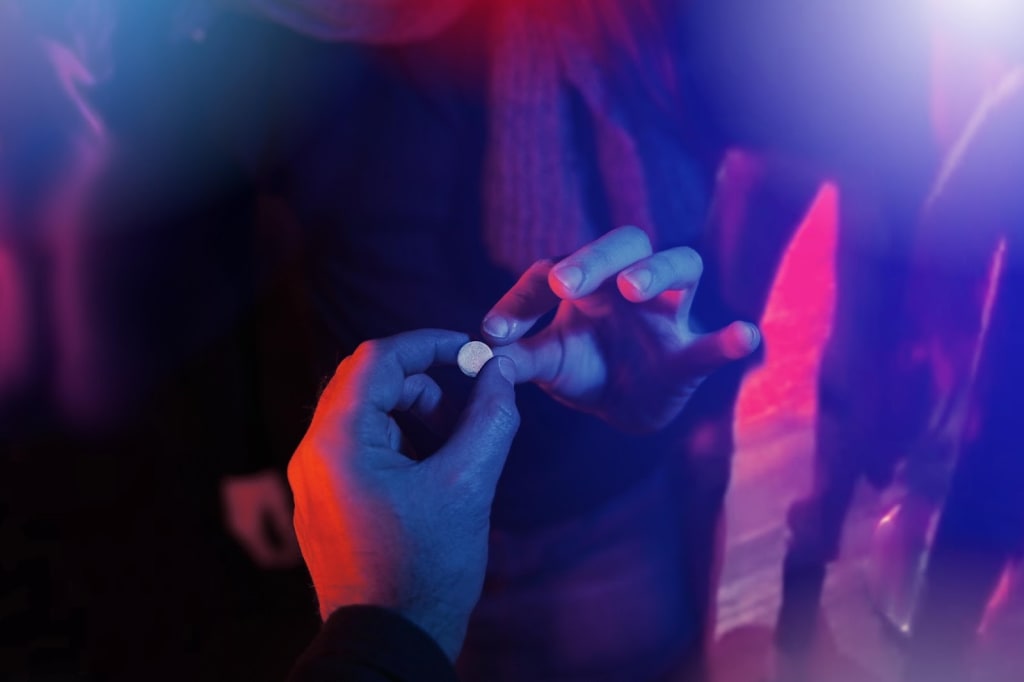Signs of an MDMA Overdose to Watch Out For
Learning about the dangers of MDMA

By Jonathon Beazley, Founder, Bodhi Addiction Treatment Center
MDMA is a synthetic party drug, also known as Molly or Ecstasy. These recreational drugs are popular at music festivals, raves, concerts, and parties. The drug’s effects are thought to enhance the sensory experience, thereby making the event more pleasurable. In addition to the altered state, MDMA also increases energy and produces a state of euphoria.
But these colorful pills are anything but harmless. In fact, over 22,000 emergency room visits in 2011 involved MDMA, according to the CDC’s DAWN Patrol report. There is a risk of overdose, especially if the drug is combined with other substances, as well as the risk of unknowingly consuming MDMA that contains other drugs. Read on to learn more about the dangers of MDMA.
What is MDMA?
MDMA (methylenedioxymethamphetamine) is a synthetic drug composed of amphetamines and hallucinogenic compounds, and is popular among teen and young adult partygoers. MDMA is a Schedule I DEA Controlled Substance, meaning that it has no medicinal value and is prone to abuse.
The MDMA Experience
MDMA is popular for a reason, as it is known for producing enjoyable effects. After ingesting MDMA the individual soon experiences feelings of pleasure and emotional warmth towards others. The MDMA compound interacts with brain chemicals, including dopamine, serotonin, and norepinephrine. The effects of MDMA include:
- Increased energy
- Distorted sensory perception
- Hyperactivity
- Elevated blood pressure and heart rate
- Sexual arousal
- Decreased appetite
- Sense of trust
- Heightened emotions
- Hallucinations
- Reduced sleep
The effects of MDMA last 4-8 hours, although users might continue experiencing certain after effects that linger. These include sleep disturbances, anxiety, depression, memory impairment, impulsive behavior, aggression, loss of interest in sex, and a suppressed appetite.
MDMA Dangers
Never has it been more dangerous to ingest drugs purchased off the street or online. This is due to the frequent presence of other substances clandestinely contained in the drug. Analysis of MDMA has revealed the drug contains cocaine, ketamine, bath salts, and methamphetamine.
Overdose is a risk, especially if the MDMA is taken with other substances, such as alcohol and marijuana, which enhance its effects. Alcohol poisoning can occur because the MDMA masks the sedating effects of the alcohol, allowing the person to drink more than is safe.
Other dangerous outcomes from using MDMA include:
- Mild psychosis
- Sexual promiscuity
- Driving under the influence
- Heart problems
- Restless leg syndrome
- Serotonin syndrome
There are several other potentially dangerous party (or club) drugs that are popular among young adults. These include psychedelics, like mushrooms and LSD, ketamine, salvia, inhalants, prescription stimulants (Adderall), and cocaine.
MDMA Dependence
As with any psychoactive drug that provides a pleasurable experience, the effects of taking MDMA are registered in the brain’s reward system. This is a prompt to repeat the experience, as MDMA is a habit-forming substance. With extended use of MDMA the risk of chemical dependency develops. Withdrawal symptoms that emerge when the drug’s effects wear off is a clear sign of dependence.
MDMA withdrawal symptoms include:
- Irritability
- Insomnia
- Paranoia
- Mood swings
- Fatigue
- Loss of appetite
- Mental confusion
- Panic attacks
- Depression symptoms
- Anxiety symptoms
- Hallucinations and delusions
- Difficulty concentrating
- Memory problems
- Lack of motor control
MDMA Overdose Signs
When an individual consumes an excessive dose of MDMA the risk of overdose is high.
Toxic levels of MDMA are first noticed with signs like uncontrolled body movements, clenched jaws, fever, and mental confusion. As these symptoms intensify, other dangerous symptoms emerge, including:
- Hyperthermia
- Fainting
- High blood pressure
- Seizures
- Panic attacks
- Loss of consciousness
If an overdose is suspected, it is important to call for medical assistance. Once at the hospital, the dangerous symptoms, such as the high body temperature and blood pressure, will be immediately addressed. The medical team may attempt to neutralize the residual toxins by administering activated charcoal.
After an excessive dose of MDMA the individual may experience protracted symptoms that emerge a day or two after taking the drug, referred to as the crashing effect. The symptoms include a lack of appetite, lethargy, and symptoms of depression.
MDMA Abuse and Addiction Treatment
When a young adult develops a chronic problem with MDMA, or any substance of abuse, they have acquired a substance use disorder. Substance abuse involving MDMA can become habitual, which can lead to dependence and even addiction. This means the individual has lost control over the drug, and the MDMA begins to impact all aspects of their life.
When a substance use disorder has developed a comprehensive addiction treatment program can provide the support and guidance needed to overcome it. This involves a multi-modal approach that employs a variety of therapeutic techniques. All of these treatment interventions are geared toward education and making needed changes in behaviors.
Treatment for MDMA dependence or addiction includes:
Detox. Detox launches the recovery journey by purging the body of the toxins related to MDMA. Most of the withdrawal symptoms are psychological in nature, and will be managed by the detox support team. The timeline for MDMA detox and withdrawal is 5-7 days on average.
Therapy. Evidence-based therapies that are scientifically studied and have demonstrated efficacy. Therapies that help individuals change their behaviors include cognitive behavioral therapy, dialectical behavior therapy, motivational enhancement therapy, and contingency management.
Group support. Peers interact in group therapy sessions where they are encouraged to participate in discussions. Small group sessions offer a supportive space where they can share their personal experiences. A clinician guides the topics of discussion and helps facilitate the conversation.
Life skills. Recovery tools can equip the newly sober individual when encountering challenges in recovery. One of these is to form a relapse prevention plan, which outlines personal triggers and actions to take when tempted to return to MDMA use.
Holistic activities. A successful recovery will depend on an alignment of mind, body, and spirit. To achieve that certain holistic techniques are practiced during treatment. These include mindfulness, yoga, massage, acupuncture, deep breathing exercises, guided imagery, and art therapy. Relaxation techniques to help manage stress and anxiety are essential in recovery.
Escaping the grip of MDMA is entirely possible. Rehabilitation is a process that takes commitment and patience, but which also yields many wonderful fruits.
About the Author
Jonathan Beazley, Owner of Bodhi Addiction Treatment and Wellness, in spite of a supportive family and a happy childhood, started at age 15 to walk down the unhealthy path of addiction and to turn his life upside down. He carved out a new path for himself in sobriety, and later began his career in the field of rehabilitation. He has since helped and advised well over 30,000 individuals and families in finding their right path. Jonathan is a Registered Addiction Specialist Level 2 and a Certified Addiction Specialist. His vision is to help heal addicts through health and wellness. He carries out his life’s purpose in beautiful Capitola, CA.
About the Creator
Jonathan Beazley
My name is Jonathan Beazley I am a Certified Addiction Specialist and founder of Bodhi Addiction Treatment and Wellness located in Capitola, CA. My vision is to help heal addicts through health and wellness. https://bodhiaddiction.com/






Comments
There are no comments for this story
Be the first to respond and start the conversation.